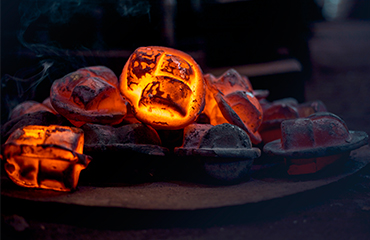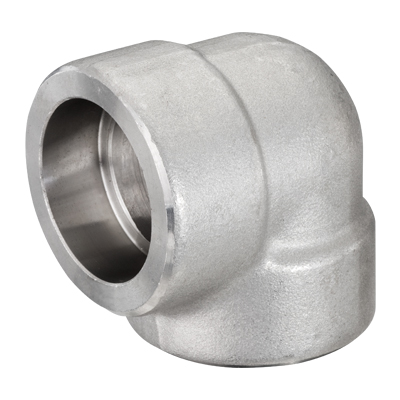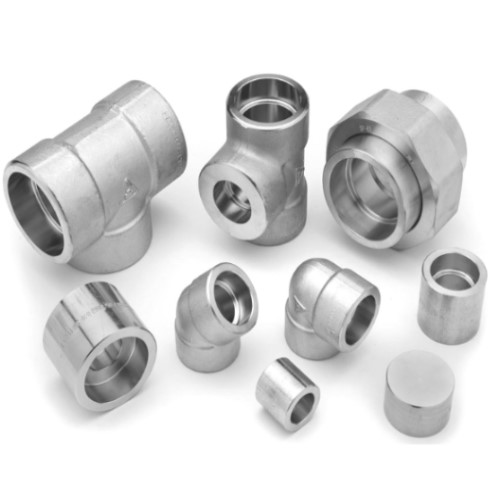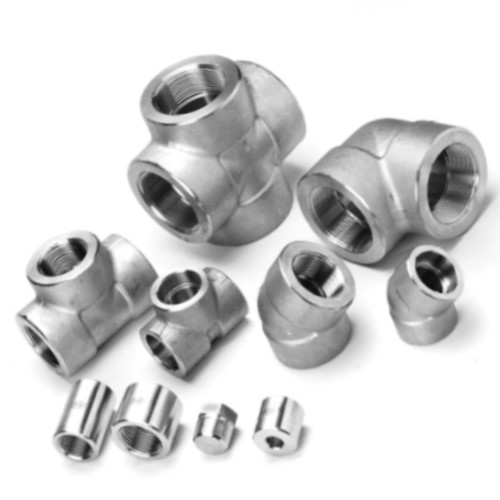Forged Pipe Fittings is a category of Industrial pipe fittings which is used for high pressure piping. The category emphasis on the word “Forged” which indicates manufacturing process of this type of fittings. To know more about Forging, click here.
These kind of pipe fittings are usually made of forged metal, steel or alloys. Any metal or alloy which is forged has a finer grain structure building up its overall strength. In comparison to other forms of fittings like cast pipe fittings or wrought pipe fittings, forged fittings are the toughest and so are used for high pressure piping. The term high pressure is often used as a prefix to forged pipe fittings.
Manufacturing forged pipe fittings
As the name suggests forged pipe fittings are primarily manufacturing using forging method. Either closed die or open die forging depending upon the size, material availability, urgency and complexity of the design of the fittings. Following the forging, these are machined to the required dimensions and tolerance (See Image 2). The walls of these forged pipe fittings are usually thick to contain the high fluid pressure.

Image 2

Image 3
Types of Forged Pipe Fittings
Forged pipe fittings are further classified into 2 main types which is forged socket weld and forged threaded or screwed. This is basically on type of their end connections to other piping components. Forged socket weld pipe fittings have a step of thickness equals to the thickness of the corresponding pipe or fittings to be welded into (See Image 3). Forged screwed or threaded pipe fittings have threads at the mating end whether female or male depending upon the threads on the mating component (See Image 4). There is a 3rd type of forged pipe fittings which has unlike the other 2 have buttweld ends (See Image 5) and it is manufactured because of couple of reasons like availability in larger sizes unlike socket and screwed fittings which is usually up to size 4”. Whereas forged buttweld fittings can be made up to 24” in size. Other reasons include raw material feasibility, wall thickness requirement, cost, etc.

Image 4

Image 5
Components of Forged Pipe Fittings
Forged pipe fitting components are categorized as below.
Add product hierarchy below with small images.
Materials for Forged Pipe Fittings
Under piping code, there are various forging steel and alloy specification which are specially designed for the use of manufacturing forged pipe fittings. ASTM A105, ASTM A182, ASTM A350, ASTM B151, ASTM B381, ASTM B564, etc. are some of these specifications. These specifications cover low temperature carbon steel, high temperature carbon steel, alloy steel, stainless steel, high nickel alloys, titanium, tantalum and zirconium. To know full list of material specifications, please check our page. https://www.forgedpipefitting.com/material/. Apart from standard material specifications,forged pipe fittings can also be made from wrought steel specifications which will be added here later.
Dimensions for Forged Pipe Fittings
Like all industrial piping products, forged pipe fittings are also designed with dimensional standards and specifications, some of those are ANSI/ASME B16.11, MSS-SP-79, 83 and 95, BS 3799. These mentioned standards cover almost all components of forged pipe fittings, socket and screwed inclusive. To know more visit https://www.forgedpipefitting.com/dimensions/.
Applications / Uses of Forged Pipe Fittings
Forged pipe fittings are primarily used for high pressure piping across chemical process plants, food and beverage processing facilities, marine and off-shore industries, oil and gas platforms, paper pulp processing, metal and mineral mining sector, power generation, ship building, water desalination plants, and many more.
